Action for Primates
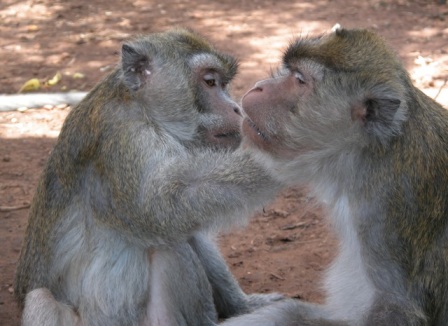
|
Action for Primates |

|
|
The following are news items we have posted in 2021. See elsewhere for news from other years.
Index of news items; select date & title to access:
17 November 2021: Monkeys destined for US labs die on board Wamos Air flight
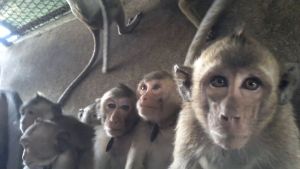
Animal Protection groups are calling on the Spanish holiday charter airline, Wamos Air, to immediately stop transporting monkeys for research laboratories following the tragic deaths this week of several monkeys on board its flight from Cambodia to the US.
The tragedy began Sunday 14th November. According to a tip-off received by a concerned person in Madrid, Wamos Air transported 720 long-tailed macaques as cargo on Flight EB998 from Cambodia (PNH) to Houston (IAH) (AWB 46090129060). The ordeal suffered by these monkeys included confinement inside small transit crates for 24 hours of flying time, with an additional six hour stop-over in Tbilisi, Georgia, which included a three hour delay. In addition, many hours would have been spent in transit to and from the airports.
In recent months, animal protection groups Action for Primates (UK), One Voice (France) and Stop Camarles (Spain), have spearheaded a campaign across Europe calling on Wamos Air to stop transporting monkeys after discovering the Madrid-based airline was flying thousands of monkeys to the US for research.
Sarah Kite, Co-founder of Action for Primates, stated: This tragedy exposes the shocking reality of the suffering inherent in the transportation of these intelligent and sentient beings. It is simply not possible to confine non-human primates to small crates, away from familiar surroundings, and transport them on long journeys across the world without causing considerable distress, physical and psychological suffering. This is an issue that attracts widespread public concern, and it is time for Wamos Air to join the long list of airlines that now refuse to be a part of the cruel global trade in monkeys for research.
We know that deaths occur on airlines flying monkeys for research, but details are rarely publicised. This shocking and heartbreaking incident on board a Wamos Air flight is a stark reminder of the very real suffering involved in the global trade and transportation in non-human primates for research.
The long-tailed macaque (Macaca fascicularis) is the most heavily traded non-human primate species for the global research and testing industry, with the US being one of the world's largest importers and users of non-human primates for research. In 2020, imports of long-tailed macaques from Cambodia by the US increased by 82.8% – from 8,571 in 2019 to 15,664 in 2020.
Wamos Air, formerly Pullmantur Air, primarily operates passenger charter flights to holiday destinations, including in the Caribbean. It is a subsidiary of the Miami-based Royal Caribbean Group (formerly Royal Caribbean Cruises Ltd), the world's second-largest cruise line entity, which operates Royal Caribbean International, Celebrity Cruises and Silversea Cruises.
During transportation, monkeys are held in small transit crates and travel as cargo. In addition to the cramped conditions, they may be forced to endure inadequate ventilation, unfamiliar and loud noises, temperature and humidity fluctuations and delays en-route. Monkeys may become ill or die in transit, as happened in this case. For others, anxiety and stress can lead to infections and the onset of disease which may remain latent until the animals reach their destination.
7 October 2021: Call for animal cruelty content to be included in proposed UK's Online Safety Bill
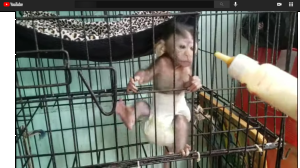
The Asia for Animals Social Media Animal Cruelty Coalition (SMACC), of which Action for Primates is a member, is appealing to a UK Parliamentary Joint Committee to ensure that animal cruelty content (1) is explicitly included in the UK government's proposed Online Safety Bill. SMACC has written to Damian Collins, MP and Chair of the Committee, established by the House of Lords and the House of Commons to scrutinise the Bill. The aim of the Bill is to establish a new regulatory framework to increase accountability of online technology companies and protect users from harmful online content.
Animal cruelty content on social media is a serious and growing animal welfare issue. Its easy availability, and the failure of the tech platforms to self-regulate, also puts people at risk – particularly children and young adults, whose psychological development can be negatively affected by witnessing animal abuse (2). Animal cruelty content is produced in countries around the world. Regardless of where it is produced, its audience is global, and this is an issue that must be of vital concern worldwide – including in the UK.
According to the RSPCA, nearly a quarter of UK schoolchildren aged 10-18 years had witnessed animal cruelty or neglect on social media (3). SMACC expects this shocking number to rise with the rapid proliferation of online animal cruelty content.
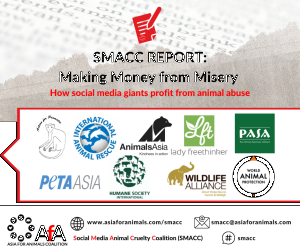
SMACC recently published their findings on the nature and volume of animal cruelty content available on three major social media platforms (4). Several dozen of the 5,480 cruelty content videos they documented were filmed in the UK, and several hundred were uploaded from the UK (second only to Indonesia and the USA). At the time the report was published, the videos had collectively been viewed 5,347,809,262 times.
Sarah Grant, Asia for Animals and SMAC Coalition Coordinator, stated: Most of the videos we documented were clearly produced just for sharing on social media, for likes, shares, or even for profit. We saw films of kittens being crushed; fully conscious animals being eaten alive; baby monkeys teased, hit, near-drowned – even buried alive.
SMACC documented numerous fake rescue
videos, in which animals are subjected to stressful, dangerous situations or harmed in order to be rescued
on camera. Monkey hatred
content is also widespread on social media, often on channels or pages that exist solely to promote content showing monkeys being tormented, severely injured or killed. Over seven hundred of the 5,480 videos SMACC documented involved non-human primate abuse.
Despite YouTube's stated ban on animal abuse or violence, SMACC documented thousands of violent or otherwise abusive videos, some of which had been live for years. Of the 41 such videos that were reported for abusive content to YouTube in August – freely available online in the UK – all but one were still available a week later.
Sarah Kite, of SMACC member Action for Primates, argued that: Self-regulation by the tech platforms is not working, and effective legislation is required. Social media platforms have failed to effectively police or enforce their own guidelines, to stop this harmful content. They are just not doing what they claim to do.
The SMAC Coalition urges the Joint Committee to explicitly bring animal cruelty content within the scope of duties imposed on tech platforms by the proposed Online Safety Bill. Online platforms should be legally obliged to implement and enforce strict guidelines prohibiting animal cruelty content, and thereby protecting the most vulnerable in society from harm.
The Asia for Animals Coalition is a global network of animal welfare and conservation organisations with a shared goal of reducing non-human animal suffering across Asia and around the world. SMACC includes: Action for Primates; The Animals Asia Foundation; Humane Society International; International Animal Rescue; Lady Freethinker; PeTA Asia; and World Animal Protection.
References:
a range of human behaviours, performed intentionally or unintentionally, that cause animals harm or suffering which may be immediate or long-term, physical, emotional, or psychological.
11 July 2021: The sickening global trade in wild-caught non-human primates continues
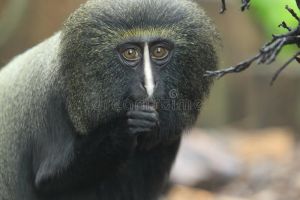
Last year, 2020, provided a wake up call to the world. There was a reaffirmation of just how fragile the environment is and the devastating impact human activities, such as deforestation, hunting, trafficking and pollution, are having on it and the wildlife with whom we share this planet. Despite this, non-human primates continued to be captured from their natural habitats, torn from their family and social groups and shipped around the world as part of a sickening legal trade in wildlife.
For 2020, the DRC (Democratic Republic of the Congo) recorded a commercial wild-caught trade in several species of non-human primates, including the owl-faced monkey (Hamlyn's monkey), golden monkey, black crested mangabey, De Brazza's monkey, greater spot-nosed monkey, Wolf's mona monkey, brown greater galago and Mohol bushbaby. All non-human primates are considered at risk and are CITES-listed. The golden monkey and Hamlyn's monkey, who are listed as 'Endangered' and 'Vulnerable' on the IUCN Red List of Threatened Species with their populations in decline, are threatened by habitat loss and poaching. The countries to have imported non-human primates from the DCR were Afghanistan, Thailand, Togo and United Arab Emirates.
Tragically, the number of wild non-human primates traded by the DRC is likely to increase dramatically during 2021. The country has set an export quota that allows 1,250 individuals to be captured in the wild and exported. This quota includes L'Hoest's monkey (100), grey-cheeked mangabey (100), black crested mangabey (150) and Angola colobus (50), all of whom are listed as 'Vulnerable' on the IUCN Red List. Their populations are in decline, with threats including loss of habitat and hunting.
The global wildlife trade is the biggest threat to the survival of many endangered species. It is a trade responsible for destroying habitat and the lives of millions, including non-human primates, captured to be sold as 'pets', exploited as 'entertainment', or slaughtered for their bodies to be used as food, trophies or medicinal products.
It is shocking that we recognise the fragility of the planet, yet many countries continue to allow this cruel exploitation of our closest non-human relatives. Governments must protect wild populations of non-human primates and not grant permits that allow them to be captured and exported for any reason.
#EndWildlifeTrade #ProtectPrimateHabitats #protectprimates
26 April 2021: Mauritius government gives permission for capture of wild monkeys and expansion of monkey breeding farm
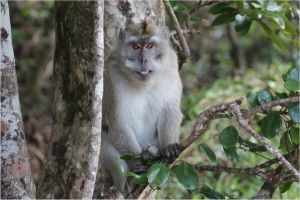
Action for Primates has condemned as a 'backward step' the decision by the government of Mauritius to grant permission for the expansion of Biosphere Trading Ltd and to allow the company to capture around 1,000 wild monkeys. Biosphere Trading, a company at Closel in Tamarin Falls, breeds and exports long-tailed macaques for research. It has been reported that it will now increase its current capacity of 800 monkeys to 7,500 monkeys, with the aim of exporting 1,500 monkeys per year to the USA and Canada (1).
Mauritius is already one of the world's largest exporters of monkeys for the global research industry, exporting thousands of monkeys every year to the USA and Europe. In 2020, 10,827 long-tailed macaques were exported from the country, an increase of 40% (3,088 monkeys) to 2019.
Action for Primates, Progress Science Mauritius, One Voice and Animal Rights, who led an international campaign representing many thousands of people from within Mauritius and around the world, are dismayed this decision was made at a time when there is widespread global concern over the capture of wild non-human primates, especially because of the cruelty and suffering caused by the removal of such animals from their natural habitat, social and family groups. They are concerned that such a step could lead to the resumption of the large-scale commercial trapping of wild long-tailed macaques in Mauritius.
Several official bodies and organisations, including the European Union, recognise the suffering involved in the capturing of wild non-human primates. For example, the International Primatological Society (IPS):
...the capture of nonhuman primates from the wild is stressful for the animals and increases the suffering, risk of injuries, spread of disease and even death during capture, storage and transport(2)
The European Union Directive (applied across the EU in 2013) recognises that the capture of non-human primates from the wild is highly stressful for the animals concerned and carries an elevated risk of injury and suffering during capture and transport. In order to end the capture of animals from the wild, including for purposes of breeding, the Directive introduced provisions with the objective of moving towards using only non-human primates who have been bred in self-sustaining colonies, from parents who themselves have been bred in captivity (3).
Holding and transportation are additional sources of stress and suffering, as the monkeys are shipped on long journeys around the world in the cargo holds of aeroplanes. There has been much evidence accumulated over the years that has revealed the immense cruelty and suffering that is inflicted on monkeys during their capture, caging, holding and transportation.
References:
5 April 2021: Japanese macaques used in painful research
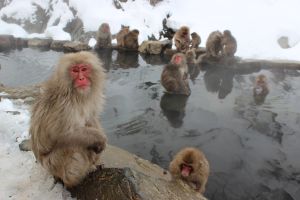
Japanese macaques, commonly known as snow monkeys, are famous for enjoying and bathing in hot springs in their native habitat. Few people will be aware, however, that not only are these macaques captured from the wild and killed following human-macaque 'conflicts', but they are also used in research in Japan, as well as exported overseas to be used in other laboratories. In 2019, 59 snow monkeys were exported to China, including 57 who were captured from the wild in Japan.
A recently published experiment carried out on snow monkeys at Osaka University in Japan, involved using the monkeys as a 'model' for central poststroke pain, which is caused by damage to the brain (1). The monkeys were deliberately subjected to pain and then the researchers tracked changes in the animals' pain threshold using a behavioural experiment and tracking anatomical and functional changes in the brain by using magnetic resonance imaging (MRI).
In two adult male snow monkeys, a specific part of the brain was damaged to create central poststroke pain
(CPSP). Under anaesthesia, part of the scalp was removed and a recording chamber was screwed to the skull with at least one hole into the brain for injecting the compound that would cause the artificial stroke and for making recordings. Head posts were also implanted into the monkeys' skulls. For recordings, the monkeys were forced to sit in a device made of acrylate glass with their lower backs and heads immobilised. Their wrists were also fixed in place to keep their palms facing downwards. An eyeshield was used so that the monkeys could not see their hands and stimulators during the experiment. The monkeys had to do certain tasks and respond to painful stimuli. They were deliberately subjected to pain through a hot stimulus (45-50°C) and a cold stimulus (5-15°C). In their Supplementary Information document, the authors stated that To avoid burns, each trial took less than 1 minute. ... Monkeys could get a food reward if they could endure the stimulus for 1 minute.
The fate of the macaques was not stated.
The authors acknowledged there were major limitations to their research, in design and results. This raises questions as to why the study was approved, subjecting the snow monkeys to this brutal research. Among the limitations listed were 1) the type of artificial brain damage was different to that in people with stroke, 2) the pain induced by the stimulations was not the same as the persistent pain experienced by people suffering from CPSP, and 3) the pain rating scale commonly used for people suffering from CPSP was not used because such subjective measures could not be obtained from the monkeys.
These and the other limitations acknowledged by the researchers reinforce our recurring argument that using non-human primates to study human illnesses is not only morally reprehensible, it also lacks scientific validity.
Reference:
1 March 2021: Macaques injected with toxic solvent to deliberately cause liver damage
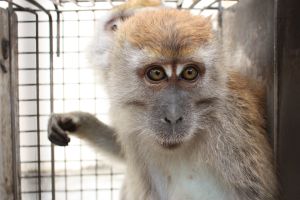
Thirty male long-tailed macaques were used in this research carried out to evaluate the different stages of liver fibrosis (scarring of liver tissue) in long-tailed macaques (1). Eight of these individuals died before the study was completed. The work was done at The Third Affiliated Hospital of Guangxi Medical University in China, approved by the medical ethics committee and experimental animal ethics committee, and funded by various sources within China.
The macaques were injected subcutaneously with carbon tetrachloride twice a week. Carbon tetrachloride is used as a solvent for oils and fats, as a refrigerant and as a dry-cleaning agent. It is highly toxic and carcinogenic. Presumably to add to the liver damage suffered by these monkeys, they were also fed a high-fat diet supplemented with about 35% cholesterol and the only source of fluids given to them was an ethanol (alcohol) solution (10% in water). Every four weeks after the injection with carbon tetrachloride, the macaques were anaesthetised with ketamine in order to get liver tissue via needle aspiration. The animals were also subjected to magnetic resonance imaging (MRI). After 20 weeks, the macaques were anaesthetised with ketamine and killed by injecting air into an ear vein. Liver tissue was collected for examination.
Eight of the macaques died during the study. The remaining 22, who were killed, were all found to have fibrosis of the liver, most with severe damage. The authors of the paper provide no details of the clinical condition of the monkeys, especially those individuals who died during this appalling 'experiment'.
The aim of the work was to develop a model
of liver fibrosis in the long-tailed macaque. The artificial nature of the research, the lack of application to people who suffer liver damage caused by a variety of factors (and not by injecting themselves with a solvent!) and the infliction of such severe suffering on sentient beings is morally and scientifically unacceptable. It leaves us wondering what working definition of ethics
was used by the institution's medical ethics committee and experimental animal ethics committee
.
Reference:
This article is licensed under a Creative Commons Attribution 4.0 International License.
2 February 2021: Photos of rescued macaques
Here are some photos of Mona, Boim and Boris settling in at the Jakarta Animal Aid (JAAN) wildlife rescue centre, enjoying their first days of freedom from the torment and cruelty inflicted upon them by the YouTuber in Jakarta. The monkeys were confiscated by the Indonesia authorities (see our Take Action alert for more information), following complaints submitted to Dr Anies Baswedan, the Governor of Jakarta, including a report from Dr Nedim Buyukmihci, veterinary adviser from Action for Primates.
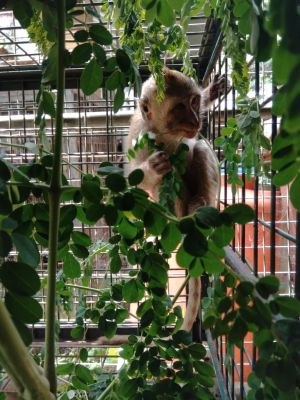
Jakarta Animal Aid Network |
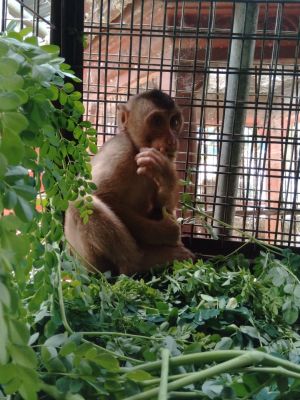
Jakarta Animal Aid Network |
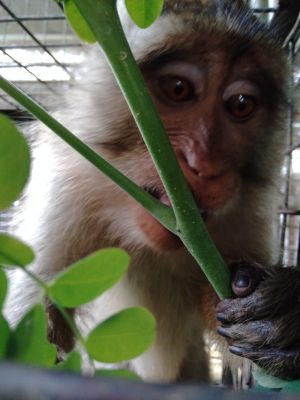
Jakarta Animal Aid Network |
There has been widespread news media coverage in Indonesia and condemnation of the abuse suffered by these monkeys filmed for 'entertainment' and broadcast on YouTube. The cruelty included rubbing obnoxious substances such as glue or chilli onto the monkeys' food and lighting firecrackers and sparklers to scare them.
Headlinesmania.com
Kompas.com
The rescue of these monkeys demonstrates the importance of writing letters and sending E-mail to those who have the ability to make change. Although we can never know whether we will be successful every time, we can be sure that a lack of action will fail. This confiscation will, we hope, send an important message and help to deter people from mistreating non-human primates and others.
It has also shone a spotlight on YouTube and its shameful promotion of animal cruelty by allowing such abusive content to be broadcast. Despite the action taken by the Indonesian authorities, the YouTube channel continues to be available, broadcasting the sadistic and cruel treatment of non-human primates.
Please continue to send polite E-mail to Ms Susan Wojcicki, Chief Executive Officer, and ask her to enforce YouTube rules and take down all animal abuse videos: susan@google.com (clicking on Wojcicki's E-mail address will automatically Cc press@google.com)
9 January 2021: Macaques subjected to two months of unpredictable stress to simulate 'depression'
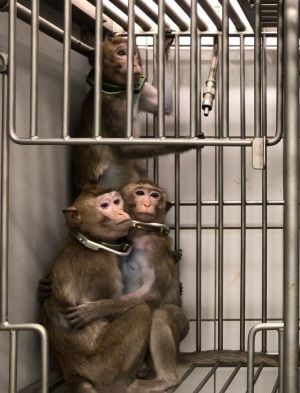
A group of 16 female long-tailed macaques were subjected to cruel and inhumane treatment in an attempt to simulate depression with chronic unpredictable stress (CUS), and then to study the effects of drugs (1). The chronic stressors included food and water deprivation, space restriction and restraint, loud noise, strobe light, and intimidation with fake snakes. The work was approved by and done at the Beijing Institute of Pharmacology and Toxicology, Beijing in China.
Ten of the macaques were of low social status...tended to be alone, always bullied by other monkeys and afraid to fight for food with other monkeys...
These were the stress group
; the other six normal
macaques served as the control group
. All were singly housed in barren, steel cages. For eight weeks, each individual in the stressed group was subjected to chronic unpredictable stress, two on each day lasting 12 hours each:
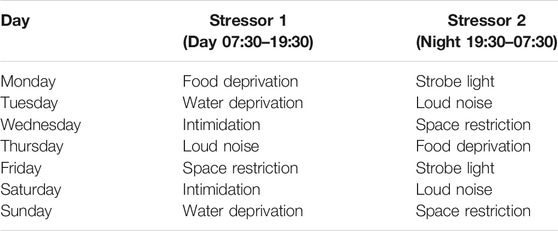
The macaques were observed for behavioural changes – huddling and self-clasping classed as negative depression-like behaviour and locomotion and environmental exploration as positive. After eight weeks, the individuals in the stressed group were given a test drug and their behaviours observed. The drugs apparently reduced depression-like behaviors
. The fate of the macaques was not stated.
There is no doubt the monkeys suffered substantially in this research. To treat non-human primates so cruelly under the guise of science is immoral. Further, the artificial stressors inflicted on these monkeys cannot compare to the complex emotional, genetic and environmental stressors that cause mental illness and depression in humans.
Reference:
This is an open-access article distributed under the terms of the Creative Commons Attribution License (CC BY).
![]()
![]()
![]()
![]()
![]()
Contact us via E-mail
Copyright © 2020-2025 Action for Primates. All rights reserved.